www.bloomsbury.com/WhereCanClassicsTakeYou
A note from the Bloomsbury Classics team
Hello and welcome!
We launched our Where Can Classics Take You? campaign to highlight the long-term benefits and importance of a subject we care so deeply about. Whether it’s learning a classical language or studying the ancient world, Classics teaches so many transferable skills that can open up numerous career opportunities.
In these pages you’ll find interviews, stories and personal accounts from people who studied Classics. Each of them tell us, in their own words, what they love about Classics and where it’s taken them. Plus, you’ll find book recommendations and resources from our partners to help you find out more about Classics and the communities available to you.
Thank you to all who helped contribute to this magazine!
Would you like to share your Classics story? Email us at schoolsclassics@bloomsbury.com
@BloomsburyClass www.bloomsbury.com/WhereCanClassicsTakeYou @bloomsburyclass.bsky.social

A Love for Classics Student Competition
Students share their love for Classics
We asked current students of Classics from KS3 to A Level to share (in their most creative way) what it is they love the most about their subject.
Here are our chosen winners:
Key Stage 3 (11-14)

WATCH VIDEO

Read Poem

Listen to song
Winner
- Ianthe Wilding, King’s Ely School
Name of entry: Tantalus
What the judges said:
“Magnificent - I especially loved the dance routines - but this was a serious labour of love”
GCSE (14-16)
Winner
- Elika Dutta, Channing School
My Love For Classics poem
What the judges said:
“Clever, and respects not only what Classics is in the classroom, but also what it really means to someone learning about people long ago and how they still affect us today.”
AS and A Level (16-19)
Winner
– Atlas Rowe, Truro and Penwith College
Will I be Enough For You? song
What the judges said:
“A brilliant song, performed beautifully. Andromache’s perspective really shines through; the writing shows a deep understanding of the character’s thoughts and feelings and imbues the performance with such gripping emotion.”
Find all winners and runner-up entries at bloomsbury.com/ALoveForClassics
So, you want to be a Classics teacher?

Steven Hunt is Associate Teaching Professor in Classics Education at the University of Cambridge, UK, and is Subject Lead for the PGCE in Latin and Classics. He works extensively with the charity Classics for All to develop a love of the Classics in state schools in the UK. He’s also the author of numerous Bloomsbury books –including the popular Starting to Teach Latin!
Latin is not just a language: course materials emphasise that knowing the language is key to understanding the culture and history of the ancient Romans themselves – and the way they have influenced thought, literature and art ever since. And they continue to affect our cultural life – not just in Europe and North America, but increasingly in the Far East, where at the university level many Chinese are now finding much to value in the ancient Greek and Roman authors and are comparing them with the way their own philosophical ideas have developed. Latin GCSE is a mini liberal arts course, encompassing language skills, the appreciation of fine literature packed full of what are still contemporary ideas, and the exploration of ancient Roman beliefs and cultural practices.
When I took over the role of Subject Lecturer in Classics Education at Cambridge University, I realised the need for a book which would help not just my own teacher trainees, but also many of those students who came straight out of university and went into teaching without training, but learning ‘on the job.’
Because of the lack of a central place for information about teaching and learning Latin and the other classical subjects regularly taught in schools (Ancient Greek, Classical Civilisation and Ancient History), I found myself inundated with questions about all of them – how to teach, what course books to use, the types and content of exams – even questions about the right Latin for mottoes and tattoos! Unless you had gained access to the hortus secretus / secret garden of Latin, there was almost no collective memory of where to start and how to keep going.
Starting to Teach Latin (2016) was the first handbook designed to help new teachers and also for more experienced teachers as a resource for finding out where to look for teaching ideas and support in the subject community. Now in its second edition, Starting to Teach Latin (2023) has been thoroughly updated to take account of new course publications and emerging pedagogies (such as spoken Latin and simple readers). It also provides information about where to look for sources for the marginalised voices of ancient Roman women and enslaved people – an area of current interest to teachers and pupils alike.
This article was first published in the Independent School magazine
What makes a great Classics teacher?
Steven tells us about his own Classics journey and what he thinks makes a great Classics teacher.

WATCH ON YOUTUBE.
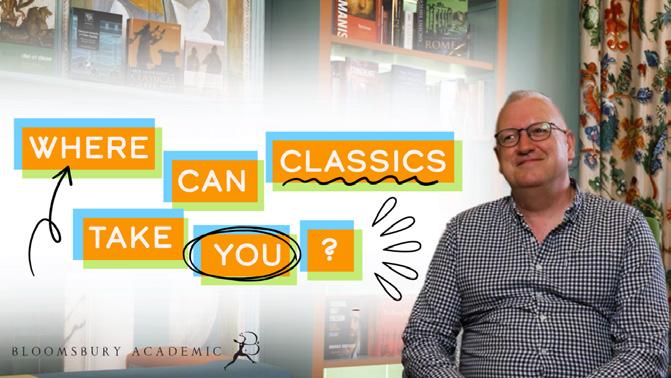

Thinking about teaching Classics?
Order your copy of���
Starting to Teach Latin, 2nd Edition, provides both practical, up-todate guidance and a theoretical overview on a number of key topics in Latin teaching.
Using a wealth of interviews, observations and pupil transcripts, Steven Hunt uses case-study evidence of excellent practice in teaching and learning from a wide variety of institutions including outreach programmes, community schools and academies across the UK and USA.



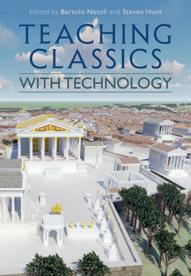
Want to become a Classics teacher?
See our Partner resources for further info (pages 30-32)
Teaching Classics Online: An Unexpected Journey

Aurelie Radway studied Literature, Languages, and Latin at university, where she developed a strong passion for these subjects. Initially trained as a language teacher, she applied for her first job in this field but was unexpectedly offered the chance to teach Latin instead. Given her fondness for Latin during her own studies, she enthusiastically accepted the opportunity and over the years made it her specialism. Now, she exclusively teaches Latin online, working as a cover teacher and tutor.
My foray into teaching Latin online was as unexpected as it was transformative. It all began when my former school reached out to me because they needed someone to step in and teach Latin GCSE — a daunting task under any circumstances. Given the short notice, I could only agree if the teaching was conducted entirely online, leaving me with the challenge of adapting to an entirely different teaching environment. This was not the familiar environment of online tutoring, where I worked one-on-one with students, though thankfully, the school had already made significant investments in IT infrastructure and had successfully navigated the challenges of online education during successive lockdowns. I quickly learnt to use Microsoft Teams beyond its typical function as a tool for virtual meetings but also realised that this new approach to teaching Latin would require not only a change in medium but also a fundamental shift in pedagogy.
Harnessing New Technologies for Latin Instruction
As I looked into the possibilities offered by new technologies, I discovered that they could, in fact, become my greatest allies. The digital tools at my disposal opened up sources and user-generated content that would have been difficult to access in a traditional classroom setting. The digital Whiteboard, coupled with screen-sharing functionalities, allowed me to explore these resources with my students, surpassing the limitations of temperamental projectors and providing a change from traditional textbooks. In our virtual classroom, discussions flourished—whether through verbal exchanges or in the chat function, accommodating each student’s preferred mode of communication. I could share videos on cultural topics, display entire extracts of Latin literature on the screen, annotate them in real-time, and have students save these annotated documents for future reference. This feature proved invaluable, particularly for students who missed a lesson, as they could easily catch up by reviewing the shared materials. The back-and-forth exchange of detailed annotations whilst assessing classwork allowed for a more collaborative and engaging approach to learning, making ongoing assessment, in my opinion, more effective. Our digital Latin classroom was dynamic, interactive, and alive with possibilities.
Comparing Online and In-Person Teaching
Of course, none of this is to suggest that online teaching can entirely replace the traditional classroom experience. There are undeniable advantages to face-to-face interaction, particularly when teaching children and teenagers. Successful online teaching requires reliable IT solutions—laptops, iPads, or even smartphones—with robust internet connections, both in school and at home, which may not be available to all. Behavioural management, too, presents its own set of challenges. It can also be harder to read body language and facial expressions. However, with the right tools and strategies, it is possible to achieve the same results online as one would in person, whether the goal is exam preparation or fostering a genuine love of the Classics.
The Online Classics Community
The challenges of teaching Latin online are compounded by the broader context in which the Classics are taught in the UK. Despite the challenges facing the field, the Classics community is small but vibrant. User-generated content and online forums are abundant and it is possible for a disciplined individual to learn rudimentary Latin independently. The Classics community has embraced modern technology with enthusiasm, recognising its potential to reach a wider audience. However, to avoid becoming too insular, it is crucial that this community continues to engage with younger generations. Many state schools may not have the resources to offer a full GCSE class in Latin, but they could introduce students to the subject through afterschool clubs or by incorporating Latin into a broader, more challenging curriculum. Publishers are beginning to embrace this shift towards digital learning, with some providers now offering entire platforms that are easily accessible to both students and educators. These platforms can even include features such as online practice exercises, vocabulary assistance, and interactive content, accredited by exam boards and complementing traditional textbooks and enhancing the overall learning experience. By making the Classics accessible to all students, regardless of background, we can ensure that this rich field of study remains alive and relevant.
The Future of Classics in Online Education
In conclusion, the possibilities of online teaching, when guided by a trained teacher, offer a unique opportunity to make the Classics accessible not only to a privileged few but also to those in state schools. Online learning provides a new perspective on languages, history, and culture, proving that the Ancients still have much to teach us. Even if the learning takes place in a virtual classroom, it remains learning nonetheless—a valuable and necessary endeavour. With the right approach, we can spread the knowledge and appreciation of the Classics far beyond their traditional confines, ensuring that this important field of study continues to inspire and educate future generations.
ORDER YOUR CLASSICS DIGITAL TEXTBOOKS VIA CLASSOOS
Classoos is a single platform for accessing online textbooks and digital learning resources. Online textbooks from Bloomsbury are available for Latin, Greek and Classical Studies covering both GCSE and A-level.
Classoos has been designed for schools that have adopted 1:1 access for their students and is available on a PC, tablet or phone. The books are also available when not connected to the internet.
Classoos enables textbooks to come to life; teachers and students can create overlays which can include supplementary content including external links (images or video) as well as notes and bookmarks. Find out more at www.classoos.com
All Roads Lead to STEM
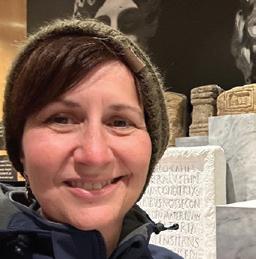
Nathalie Roy teaches Latin, Roman Technology, and Myth Makers to teenagers at Glasgow Middle School in Baton Rouge, Louisiana, USA. Students in her classes reproduce ancient Roman daily life through STEM challenges, hands-on history labs, and experimental archaeology. In 2024, they built a Roman road through their school campus, and this year, they designed and made their own Roman leather shoes.
Have you ever visited an ancient Roman aqueduct and experienced awe at its beauty and functionality? Have you ever read Julius Caesar and wondered how he built a bridge across the Rhine River in 10 days? Have you ever listened to the story of Athena and Arachne and tried to imagine what their tapestries looked like? Me too! In 2018, I decided to develop and offer a class that answered these questions and many more. I had taught Latin for nearly 25 years, and to be honest, I had gotten a little bored with teaching language. My school had hired a STEM coordinator who wanted teachers to incorporate engineering design strategies in their classes. When I told her my idea to offer a class called Roman Technology that would investigate ancient Roman and Greek engineering innovations, she offered to help. I excitedly started a summer of research to design a class that would merge STEM and Classics.
My first Roman Technology students made concrete based on Vitruvius’ recipe, baked the grape must biscuits of Cato the Elder, and styled hair in the Roman fashion based on the research of Janet Stephens, the “hair archaeologist.” I expanded the class as I learned more about experimental archaeology, STEM challenges and their use of the engineering design process, and hands-on history activities. After seven years of teaching this class, my Roman Technology students reproduce the products and processes of Roman daily life through all of these methodologies.
Two years ago, we partnered with our local state department of transportation and development to build a Roman road through our school campus. Our civil engineer consultant taught my students about his career as they learned about the history and archaeology of ancient roads near me. We surveyed our construction site with an ancient groma, moved 42 tons of stone by hand, and even poured concrete before dedicating our road in a special ceremony celebrating our donors and community partners.
Many of my students do not necessarily take Latin. Some want to take French and Spanish but also love learning about Classics. To feed a growing mythology interest at my school, I developed a course on ancient mythology called Myth Makers. After reading about the hunting prowess of Apollo and Artemis, we build and test bows and arrows. When we read about the journeys of Odysseus, Theseus, and Jason, we design and construct model ships to race in a swimming pool. One of our favourite projects is weaving. We all hope to one day achieve the skill of Arachne, but it’s ok to just learn the basics too. Last year, we took our newly-learned skills to the next level by beautifying our school with “the Penelope Project.” As a brand new (but ugly) metal
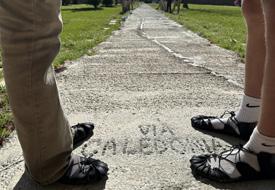

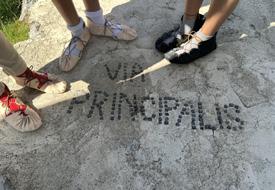

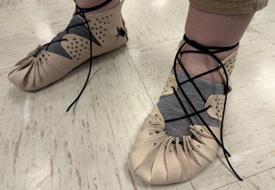



safety fence went up around our school’s campus, we decided to weave a pattern into it. Parents and neighbours have all commented on the ingenuity and beauty of our fence’s new design.
Sometimes, our projects are more personal. In this year’s Roman Technology class, students learned to design and build their own Roman leather shoes. We studied the famous leather shoes of the archaeological site of Vindolanda on Hadrian’s Wall. We visited via Zoom with Dr. Beth Greene, the archaeologist studying the shoes and the people who wore them. We learned to use leatherworking tools, fit patterns to our feet, cut the patterns out of leather, and eventually, sew up the leather to fit our feet. This project highlights why I most like to teach Roman Technology - the objects we create remind us of the people who made them and used them. Skilled craftspeople, enslaved people, women, soldiers, and children are often forgotten in classical literature. They did not have the time or resources to write about their daily lived experiences. Recreating their lives with hands-on history activities help young students to learn about them more deeply.
Archaeology yields the most interesting objects, and those objects often spark STEM projects or challenges. In one of my favourite lessons, the students learned about the technology of ancient Roman games. They researched the famous dice tower found at a fort near Vettweiss-Froitzheim in Germany. Romans used these devices to contain dice rolls and eliminate cheating, much as modern gamers use them today. After thoroughly investigating its mechanism, my students designed and built their own out of cardboard.
When I became a Latin teacher, I never expected to also become a STEM teacher, but the conjunction of Classics and STEM just made sense to me. It’s where Classics has taken me, and I LOVE this place!
Why should you study Classics?
From producing leather shoes in the Roman style to constructing model ships inspired by Odysseus’ epic journey, Nathalie Roy is bringing the ancient world to life for her students in Baton Rouge, Louisiana.

WATCH ON YOUTUBE.

Why Should You Study Classics?
Conversations with Classicists

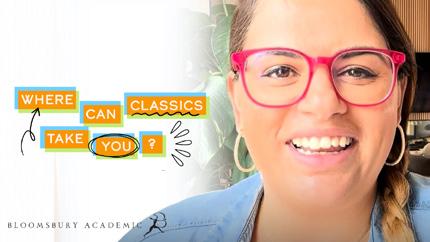

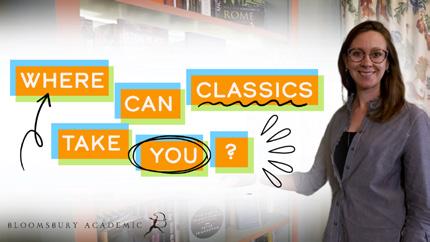

Why Should You Study Classics?
Conversations with Classicists




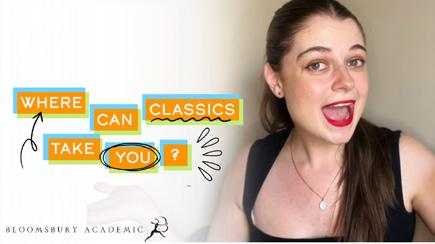
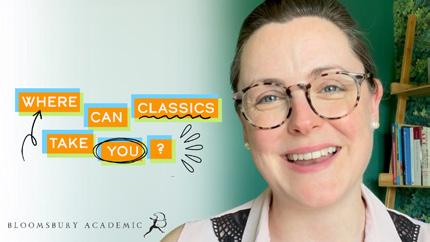
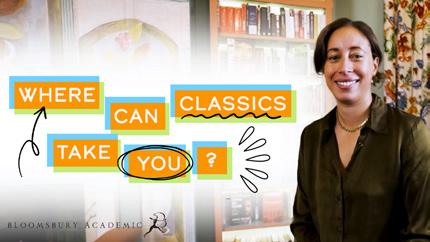
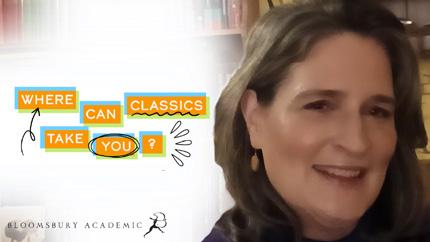
Where has Classics taken you?
We sent a message out to the Classics community asking them to tell us what they love so much about this subject and where it’s taken them. Here are just a few of our favourites.

Natalie Chapman, Campaigns Executive at Penguin Random House Audio
Studying Classics equips you for a variety of careers with transferable skills from translation to research, essay writing to critical thinking, not to mention a knowledge base spanning literature, history, linguistics, philosophy, art and more!
I chose to read Classics BA at the University of Cambridge because I wanted to study a breadth of humanities subjects, rather than being limited to just one or two. Since then, Classics has taken me from the arts & heritage sector to marketing in the publishing industry, and I'm sure it will continue to open doors for me in the future!
DD, Retired Teacher

Classics has influenced every area of my life right up to now at age 65! I studied Latin and English at Warwick, then completed an MA in Latin, before studying the Latin Speakers of the Balkans with my professor and going to drama school and on to teach Classics at Mayfield. Finally, in retirement, I am currently recreating with narrative, acting and crafting the stories from Classical Literature for children who are home educated, while also writing a novel.
Classics has affected every area of my life and made me who I am today, someone who loves to educate others, whether through performance, storytelling or writing. I simply love Classics and the way it has engaged me in literature, language and a culture that is still relevant and wonderful.

Kim Drummond, Head of Classics, St. Edmund’s School
Classics has changed my life. Having served for 23 years in the Royal Navy I undertook an Open University degree in Classics and this enabled me to, finally, become a teacher. I am now Head of Classics and passionate about my subject. I am shortly to commence a Master’s degree in Classics, again with the OU - who knows where that may take me!

William Arnold, Retired Civil Servant, UK Supreme Court
The subject is so broad it makes classicists famously flexible and able to take on anything. Also it gives a much wider perspective on the world in general.
Where has Classics taken you?

Robert Forman, Professor of English and Classics, St. John’s University, New York
My degrees in Classics have allowed me to feel at home in just about every area of literature. Deny it though they may, the most aggressive modernists use the same literary and philosophical structures that we find in the classical authors. How can one read Joyce, Arnold, or Hardy with full appreciation without knowing Homer, Virgil, or the Greek and Roman lyric poets?
Catherine Muñoz, Professor of History in University of Panama
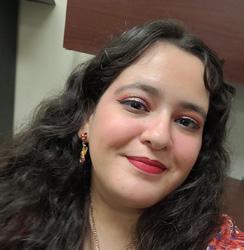
Coming from a country like Panama where the study of Classics is not common in either school or university, I must accept that studying it has opened my eyes to a completely unknown world. Everything seems wonderful and surprising to me. For example, understanding why the first governments after the Separation of Panama from Colombia in 1903 sought to base their national identity on values and characters from Greece and Rome, allows me to understand better the History of Panama, its Panama Canal and my own Panamanian identity. Although, more importantly, studying Classics has given me a way to get closer to my students and talk to them about classical reception while giving me a sense of belonging and camaraderie with other researchers outside of Panama with the same interests as me, such as those I have met in the ANTIMO project.

Amber Cann, Postgraduate Student- Museums and Galleries in Education
I love how studying Classics and being involved in Classics in any way can open up so many opportunities for creativity and imagination. To me, Classics is comparable to the ocean, it's vast, it's never-ending and you never know what hidden treasures lie beneath the surface. When studying Classics you never have to stick to a linear path, your studying journey of knowledge can be unique and full of twists and turns. Classics education is also amazing as it is constantly evolving and being reinterpreted with each generation and I think it is fascinating to see how this happens and is presented. I love Classics generally as to me it is a never ending pursuit of knowledge that can be interpreted in so many ways among students that it ends up giving students the opportunity to have a new perspective on their own world and culture around them. Classics is such a diverse subject that there is always something for everyone and allows all to feel included and their ideas valued no matter what.

Lauren Zimmerman, Senior Development Editor, Bloomsbury Publishing
I first studied Latin in high school and went on to study both Latin in Greek at Bryn Mawr College in the US and the University of Cambridge. Studying a culture so distant in time is a great intellectual exercise. It helps you to understand how so much of what we think and do is shaped by the constricts of our own time and culture, which in turn makes you a more well-rounded and intellectually open person.
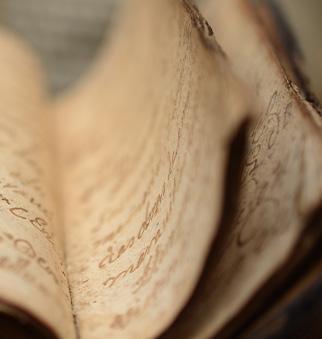
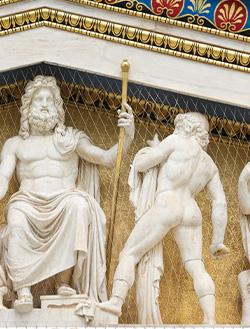


From Classics to Electric Motorsport

Hello! I’m Frederick Bird, and I work in London in the finance department at Formula E – do look up a race on YouTube if you haven’t heard of it before! I previously did a Master’s in Byzantine Studies at Oxford, and before that I did my undergrad in Classics at Cambridge.
It is a wonderful thing to be able to study the lives and thoughts of people who are, in many ways, so distant.
When studying the ancient texts, you realise that the Greeks and Romans were in some ways very different from us, and yet very relatable. It is good to be able to put yourself in other people’s shoes and to think about things from their perspective, and Classics offers a special opportunity in this regard. It should also be said that in spending time studying other people, you will learn a lot about yourself.
When I was studying Classics, I never expected that this would lead to a job in electric motorsport! Working in the finance department of Formula E has made use of lots of the skills that I’ve learnt and developed over the last few years, in particular the ability to create a concise narrative from large amounts of information and to work quickly under pressure while maintaining high standards.
I love Classics because it stimulates the mind in so many different ways.
Personally I like getting into the nitty-gritty of textual and grammatical questions. I’ve spent a long time looking at Byzantine manuscripts of classical texts, which has helped me develop an eye for detail while making sure that I don’t lose sight of the bigger picture. It has also helped me to think carefully and critically and look at problems from a new perspective. There are lots of ‘unknowns’ about the classical world and you will find that coming up with creative solutions is often the best way to give answers to age-old questions! This skill is really useful in all sorts of areas of life, and employers know that the application of creative and critical thought is usually the most important step in adding value to a project.
Classics is a very versatile degree and opens up lots of different options.
My friends who have studied Classics have gone into law, teaching, politics, finance, publishing… and many other fields! It allows you to develop and showcase many different skills that are attractive to employers.
I would also say that, even more importantly, it is a really enjoyable degree. There are so many areas that you can choose to study within the subject that if you look carefully you will find something that fascinates you. It will also enrich your life beyond university, and I certainly find that it’s still exciting to learn about the ancient world even though I’m no longer a student. I know that it can be tempting to think, ‘It will make career decisions so much simpler if I choose a degree that leads directly into a particular job’ – and this might seem the easiest option. But I would encourage you to be bold and study the subject that you enjoy the most, rather than making a more ‘tactical’ choice. It will mean that your time at university is more satisfying, and you will probably do better because of it!
From Classics to Computing
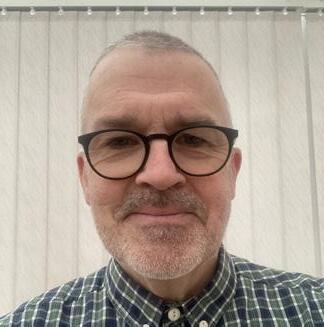
Adrian Thompson grew up in north west England, studying languages at school and university before working in a technical library then learning to program computers for large public and private organisations.
I can’t recall exactly when my love of Classics – or more particularly my love of the Latin language – started, but it must have been when I was seven or eight years old.
I used to attend the local Catholic Church with my family, and at that time in the UK, the service had elements of both English and Latin.
The service sheet therefore contained both languages and at quiet moments I compared the two … I was intrigued to see that the Latin version was in most cases shorter than the English. Now how did that happen? How do two or three English words fit into a single word of Latin? And so my fascination was born.
Classics is very dear to me. At school and sixth form Latin was my favourite subject and French and Latin were the subjects I took for my BA degree. Looking back, I realise that Latin was something I enjoyed for its own sake, and formed a welcome escape route from domestic difficulties, for which I will always be grateful.
There were opportunities to ‘use’ Latin in teaching or further academic study after my degree. However, I chose to look elsewhere and after an enjoyable spell at an academic library I decided to pursue a career in computing and was accepted by British Rail as a graduate trainee.
My studies definitely helped in my switch to IT; the process of translating Latin helped me understand the structure of certain computer programming languages, and imparted an intellectual discipline that helped me bring a structured approach to coding, testing and debugging that has served me well ever since.
After my initial training I worked on many different projects, subsequently moving to a financial services company and working with computers for over thirty-five years. Not bad for a language graduate who hadn’t really used a computer until their twenties!
If you wish to study a subject which encompasses many things which are important and may well encourage you to think in an independent way, then seriously consider the Classics.
Your life will be all the richer and your efforts in mastering language and literature will be well rewarded and become a lifelong interest.
From Classics to Published Author
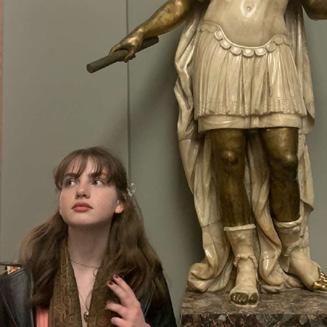
Hi. My name is Cait Kremenstein. I'm a 17 year-old Sixth Form student and lover of Classics!
I recently won the Classical Association and Bloomsbury Publishing’s creative writing competition, for which I wrote a short story inspired by the story of Daphne and Apollo as told in Metamorphoses.
My passion began in primary school; like many others my age, the works of Rick Riordan and his stories surrounding Greek mythology were my introduction to the classical world.
On reading the story of Persephone's abduction in class, my interest in the Greek pantheon only grew. I read Stephen Fry's Mythos and Heroes, both entranced and appalled by the stories of monsters, humans and gods I could recognise in the modern day.
As I've grown older, I've had the opportunity to study Classical Civilisation both at GCSE and A level, with some fantastic and truly passionate teachers. I've also attended a summer school where I got to play the titular role in Aeschylus’ Agamemnon (perhaps the first Irish teenage girl to reinvent the role?) alongside studying the ancient world.
If I had to choose a favourite part of the broad and all-encompassing subject that is Classics I think I’d say the literature, as well as classical reception.
I adore ancient plays and can firmly say that an amateur production of Aristophanes’ Frogs was one of the funniest productions I've ever seen in my life. However, I’m firmly a tragedies girl; the drama is truly timeless, containing themes that can relate to many modern political and cultural landscapes, as well as emotions; through adaption or renewal of ancient drama in modernity, we’re brought closer to ancient people that are far more similar to ourselves than different.
My love for and involvement with Classics is what inspired me to enter the writing competition.
I wanted to create a subversion of a well-known story from a female, feminist and staunchly Irish perspective – obviously drawing inspiration from authors like Madeline Miller and Jennifer Saint! I’m fascinated by the role and perception of women in mythology, in antiquity, and their reception and I was lucky enough that the judges enjoyed my exploration of this as well! I’d never really written anything inspired by Classics before, but now I’m a lot more confident in my writing and full of ideas as to how I can.
I know for a fact that Classics will continue to impact my life for years to come, as I’m planning to study it at university, alongside English!
The study of modern literature and that of Ancient Greeks or Romans is one that is constantly changing and evolving, as new authors draw inspiration from works of the past, and translators unlock new relevance within Classical poetry or prose. It’s funny to think that my life could have gone an entirely different direction without Classics; some of my closest friends are those I’ve made while learning about Catullus, drawing pictures of Cacus, and studying maps of Mycenae. It can seem daunting to be faced with such a wealth of information, history, language, art and culture bundled under one name, but I would strongly recommend to anyone that likes any of these things, especially those from Ireland and Northern Ireland like me, to explore the Classical world – you’ll probably love it as much as I do!
From Classics to Cricket

Mike Brearley is well known for his career as a professional cricketer, and he captained both Middlesex and England, most famously to victory in the 1981 Ashes series. However, he has had two other careers as well, firstly as a lecturer in Philosophy at Newcastle University in his 20s, and, since retiring from cricket in 1982, as a psychoanalyst; he was President of the British Psychoanalytic Society between 2008 and 2010. He has also written four books in the past six years. James Renshaw interviews him here about his journey into Classics and the influence it’s had throughout his career.
Mike, tell us about your journey with Classics�
I studied Latin and Ancient Greek up to A Level at the City of London School in the 1950s, and then won a scholarship to St John’s College, Cambridge to read Classics. Although I enjoyed the languages, they were taught in a rather traditional way then - as if they were crossword puzzles to be solved, with an emphasis on parsing, conjugations and declensions. Latin and Greek were put on a pedestal at that time, suitable, it was still supposed, along with cricket, to be the ideal preparation for running an empire or for entering the high echelons of the Civil Service.
Despite this, I was able to engage with broader themes of the classical world. Nowadays I see a great value in the fact that doing Classics introduced me to debates about democracy, slavery, empire, and tyranny, and to discussion of some of these themes in drama too.
It was also through studying Latin and Greek that my interest in language as metaphor began, and this helped me open up my (limited) capacity for thinking imaginatively. For example, one word derivation I particularly enjoy is ‘supercilious’ - which comes from the Latin supercilium, meaning ‘eyebrow’. I love the image of a quizzically lifted or twisted eyebrow indicating disdain or arrogance.
And so in one sense Classics has been for me in the longer run, and perhaps always to some degree, a setting off point for layered thinking and for appreciating and using language in ways that are both vague and productive. We need both ways of thinking: open-ended and precise, wide focus and narrow focus. More fundamentally, the humanities call for the development of empathy and self-awareness, for a broadening of emotional intelligence. And these are qualities which are essential both to a rich life and to the humanities in general, both personally and professionally.
You moved from Classics to Philosophy� Tell us about that�
Yes, I took a course during my first year at Cambridge in the Presocratic philosophers taught by Renford Bambrough, and found it fascinating. This sparked an interest in philosophy, which grew at the same time through conversations with a university cricket team colleague, Edward Craig, who was studying philosophy. We used to spend ages talking philosophy while fielding as wicket keeper and first slip. I chose to move to philosophy for the second part of my degree, and this then became my first career path.
How has your study of Classics influenced you as a psychoanalyst?
Let me answer that with one episode from classical literature which has especially stayed with me.
I read for Greek A Level Book 9 of Homer’s Iliad. Achilles, the greatest Greek warrior, is refusing to fight because of the insults he feels have been delivered to him by Agamemnon, the Greek commander in chief. Agamemnon eventually sees the error of his ways, and sends a delegation to deliver a fulsome apology and a fabulous set of gifts as reparation, yet Achilles stubbornly refuses to accept the apology. At this point, one member of the delegation, the wise old man Phoenix, makes a thoughtful argument. Rage, anger, and stubbornness, he says, are follies or sins. Given Agamemnon’s ample apology, the gracious thing would be to accept, and to return to help his comrades on the battlefield. For, Phoenix continues, ‘Sin goes racing around the world doing harm, while Prayer, represented by the daughters of Zeus, old, lame, and half-blind, follows them at a distance, trying to catch up and put things right.’
I remember my Classics teacher, Stanley Ward, inviting us to reflect on the moral development expressed in Phoenix’ argument, and me being fascinated by this. For people often do commit wrongs by rushing into action without thinking: our first instinct in response to humiliation is to retaliate or run away. Only later, Ward suggested, do we have second thoughts and stirrings of conscience about our over-the-top reactions, and climb down from our high horses. Like the daughters of Zeus, we find it hard to see what we’ve been doing, we’re slow to give a hearing to these more reasonbased responses.
With my experience as a psychoanalyst today, I am intrigued that this story seems to anticipate a celebrated theory of the 20th century psychoanalyst Melanie Klein, whose work focused in particular on early child development. Klein argued that healthy psychological development required the young child to move from the ‘paranoid-schizoid position’, in which difficulties are entirely someone else’s fault, to the ‘depressive position’, where guilt and responsibility may be felt and reparation made. Indeed, I could even wonder, with tongue in cheek, if Homer had read Klein before composing this speech of Phoenix!
Who would you most like to meet from the classical world?
I would have to go for Heraclitus, a Presocratic philosopher who seems to have been interested in developing a psychological account of human nature.
JAMES RENSHAW teaches Classics at Godolphin and Latymer School, UK. His books include In Search of the Greeks (2nd edn, Bloomsbury, 2015) and In Search of the Romans (2nd edn, Bloomsbury, 2019) and he is General Editor of the suite of books for OCR Classical Civilisation and Ancient History (Bloomsbury, 2017).
From Classics to PR
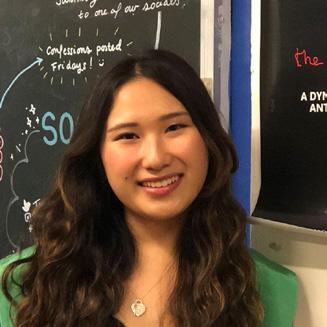
An Interview with Erika Tsang
Hi there – I'm Erika, and I’m 22 years old. I grew up in Leicester but have been a Londoner since I moved for university four years ago. After graduating with a BA in Classical Studies from King’s College London, I now work in public relations in the tech sector. For the past year, I’ve been volunteering for Classics For All as part of its student led branch The Chorus. A fun fact about me – I was named after a Pokémon gym leader!
When did your love of Classics start?
My introduction to Classics happened when I chose A Level Classical Civilisation as an extracurricular after-school activity. Not many state schools in the UK can afford to or have the resources to provide Classics as a subject. Luckily, my state school was able to access funding and teacher training from the charity Classics For All, opening up an opportunity for me to study the ancient world. I quickly fell in love with the subject, and then went on to read Classical Studies at university, graduating in 2022.
What is it about Classics that you love so much?
Classics as a discipline is exciting to me because of the variety of topics that you can learn about. During my studies, I had the opportunity to form a vivid understanding of the ancient world, by studying its history, philosophy, literature, archaeology and more. Classical antiquity is a time period that is super interesting as well because it formed the basis of much of our modern-day culture.
I have always gravitated towards ancient literature, and I especially love the classical epics – namely Homer's Iliad and Odyssey, as well as Virgil’s Aeneid. These fully fleshed stories feature moral conundrums and nuanced characters who you quickly become attached to. Studying classical epics taught me about the human condition. The ways that we act, and feel are still the same, thousands of years later. Classics may be the study of the ancient world, but it teaches us so much about humans today.
How has it helped shape your career opportunities?
After graduating from university, I began a job in public relations (PR), specialising in technology. My role revolves around helping tech companies raise brand awareness and present themselves as experts in their fields. It’s a completely different gig to Classics, but I really enjoy it, and the skills I learnt from my studies were crucial to helping me land my job.
Studying Classics taught me how to write in an engaging way and how to formulate a convincing argument. When you study Classics, it varies from day to day, from analysing Greek tragic poetry to inspecting a mosaic. This taught me how to adapt to newness quickly – something that is critical when working in an environment as fast-paced as PR!
What would you say to students thinking about choosing Classics?
I would say, if you enjoy the subject, go for it! I found studying Classics enriching and it taught me an array of skills for the workplace. During my studies I sometimes had people ask me what I could do with a Classics degree, as they were under the impression that there was a narrow path ahead career-wise.
While I do know people that have pursued more obvious choices after a Classics degree such as further study of Classics, museum work or teaching, there are also a plethora of other options for Classics graduates. I know graduates in many different sectors, from business to finance to publishing. Don’t feel like your job prospects are limited if you study Classics, as the skills you learn are widely transferable. What’s most important is that you study a subject that you love!
Can you tell us more about The Chorus?
The Chorus is the newest branch of the charity Classics For All. We’re a growing network of young classicists across the UK who are committed to improving access to classical subjects. We want to connect young classicists across the country, from sixth-form students to university graduates. Our goal is to get more students to engage with and learn about Classics, particularly those from underprivileged backgrounds.
We hold termly virtual events, called The Forum, and also have a student blog called The Rostra Previously, we’ve held events with authors Clare Pollard and Jennifer Saint respectively, as well as an event with the society London Classicists of Colour.
My role is Chair of The Chorus, so I organise our meetings, manage the committee and make sure everything runs smoothly. It’s my second year on the committee and it’s been so fulfilling to be able to reach so many students and provide these opportunities in Classics.
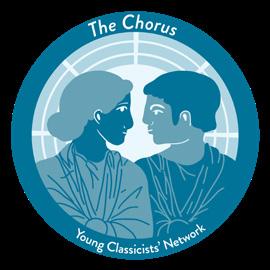
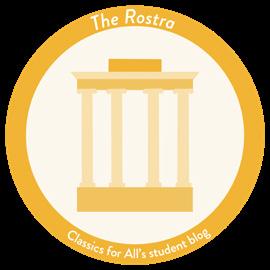
From Classics to Illustration

CORA BETH FRASER is an illustrator, award-winning teacher and Honorary Associate at The Open University. She teaches Classics to distance learners, supports autistic students, and can usually be found in a quiet corner with a sketchbook. In 2021 she co-founded Asterion, an organisation set up to champion neurodiversity in Classics; and in 2022 she was awarded the Classical Association Prize for outreach. She blogs at https://classicalstudies.support/.
My Classics “journey” started in a little North-East mining town that just happened to have its own Roman Fort.
Growing up, the Romans were quite literally on my doorstep, and the Fort was my gateway to a lifelong interest. I never expected that Classics would bring me the life I have now – teaching, researching and illustrating the ancient world – or that through Classics I would find a place where I could belong as my authentic disabled working-class self.
However, if you’d asked me where I wanted Classics to take me when I was young, I would have answered firmly, ‘Nowhere!’. I did not want to go on a journey, literally or figuratively. I was the kid who dodged school trips and avoided adventure of any kind, because even going to school every day was too much for me. I knew exactly what I needed: a safe and quiet little world of reading and learning, with cats in armchairs and old leather-bound books and fluffy blankets on cold mornings. I didn’t want Classics to take me anywhere; I wanted to take Classics home with me and shut the door. It wasn’t until many years later that I was given a word that defined my needs: autism. I was, and had always been, autistic. I needed safety, routine and control in the same way that other people needed love and friendship. The world was a terrifying place for me, and I was drawn to its quiet book-lined corners.
Classics gave me all the quiet I needed, and more.
My PhD involved hardly any interaction with living people – although I did spend a lot of time in the company of Tacitus! Later I took a job teaching distance learners, by post and phone and then online, working from home with my slippers on. My home library gradually took over one room, then another, then started to creep up the stairs. There were cats too, stretched out in patches of sunlight, making squeaky snoring noises while I wrote. Lately I’ve been making even more of my dreams come true, by finally creating some of the illustrated Classics books that I always wanted to make.
Classics hasn’t taken me anywhere, because I didn’t want to go anywhere: I wanted to stay right where I was, and I still do. But if I could, I’d love to be able to take Classics into my autistic world, just for a visit.
Within the autistic community we talk a lot about joy. “Autistic joy” is a difficult thing to define, but it’s as much a part of us as social awkwardness or sensory sensitivity. It’s the joy of being completely absorbed in a moment or a feeling or an idea, so fully and perfectly that everything else falls away.
Classicists are always questioning and challenging. It’s in our nature.
We challenge the sources, the scholarship, the boundaries of our discipline, the value of our studies, the purpose of our teaching. This, I think, is a great thing: it fuels change, drives new perspectives, and guards against complacency. But it can also be contentious and exhausting, and the joy of studying things we love can get lost.
That’s why I illustrate classical texts. When everything we say is up for debate and when every idea is subject to challenge, beautiful things remain a joy to me, like a fluffy blanket on a cold morning. Illustration is my way of inviting you to pull up a chair, curl up with a book and share my cosy autistic corner for a while, before you head off on your next Classics adventure.
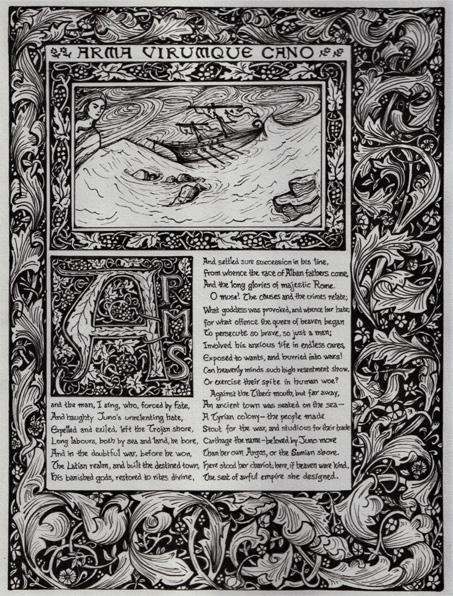
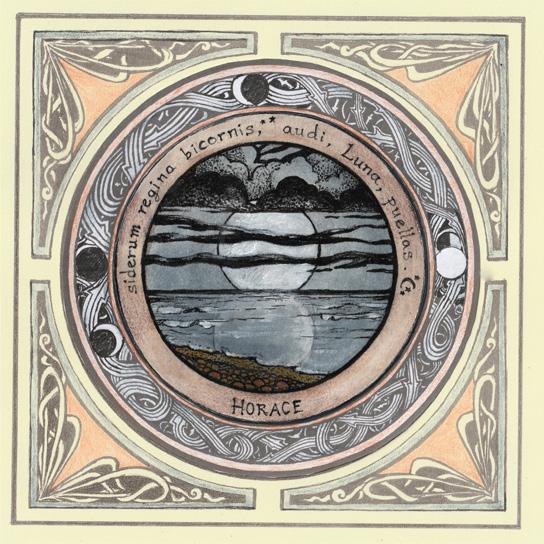

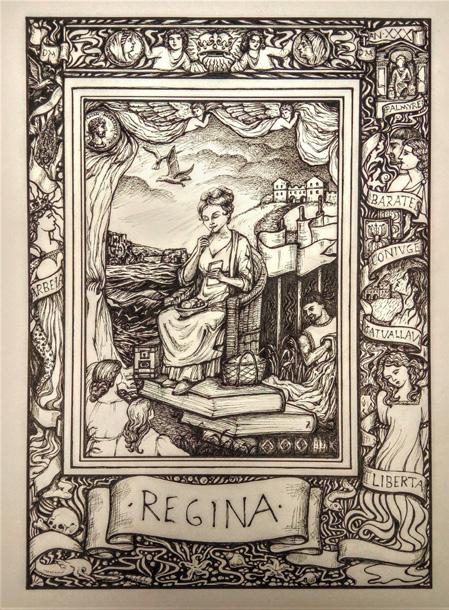
Classics Beyond the Classroom

Anya Leonard is the Founder and Director of Classical Wisdom, a site dedicated to bringing ancient wisdom to modern minds. Co-founded in 2013 with Bill Bonner, in conjunction with Les Belles Lettres, the French publishing house. Since inception, Classical Wisdom has grown into one of the largest online independent publishers dedicated to the ancient world. Anya studied philosophy and comparative literature at St. John’s College in Annapolis, a Great Books program, and received her MA in Sociology at the University of Edinburgh. She published a children’s book, Sappho: The Lost Poetess, dedicated to the life, works and remarkable recent discovery of a poem written by the 7th century Poetess, Sappho.
The Classics can at times appear niche...very niche.
Whether it is the burial traditions of Athenian war dead, pinpointing the exact moment Mount Vesuvius erupted, or the bizarre, occasionally violent religious rites of ancient women, delving into the Classics can feel like embarking on a journey to an entirely different world, one seemingly unrelated to modern life. For many of us, that is precisely the allure: to leave behind the quotidian and enter the realm of the exotic.
However, this very fascinating aspect can also make the Classics a hard sell to those unfamiliar with its charm.
It is all the more difficult because the average man, woman, and child today remain unaware of the wealth of ancient wisdom waiting to be discovered. Those of us who are acquainted with it know that even a basic familiarity with those who came before us, and the astounding, if occasionally perplexing, works they left behind, can open up new understandings of subsequent thinkers and artists.
We may stand on the shoulders of giants, but we also walk in their footsteps, yet so many do not see this. It is almost impossible to appreciate, let alone learn from, the myriad references and artefacts that surround us all without possessing the knowledge that they even exist in the first place.
From mythology, literature, and theatre to the intricate workings of history and philosophy, the ancient world has so much to offer, if only we allow it. But how exactly can we do this? How can we bring the world of the Classics beyond the classroom and into the living room, extending it beyond academia and into the everyday for the everyman?
Everyday Classics
That is the mission of Classical Wisdom. We aim to take this treasure trove of insight and demonstrate its relevance and importance in the here and now. Whether it is an engaging myth, a historical anecdote, a compelling curiosity, or the philosophical perspectives and concepts that have shaped humanity and culture for millennia, all these contributions have a continuing significance for modern audiences.
First, however, society has to care: it needs to recognise the importance of ancient history, philosophy, and art in order to help preserve them. Even elements that may not seem essential today could prove invaluable to future generations, but they will matter only if they are still around when the time comes.
And so for the past twelve years, we have been growing Classical Wisdom and its community to promote and preserve the Classics. With almost 100,000 readers across 197 countries, we work hard to ensure this is a truly global effort, because the value of the Classics is open to anyone who wants it, as evidenced by our dedicated audience in every corner of the world.
Classics Beyond the Classroom
Whether we are studying the rise and fall of empires to glean insights into today’s geopolitical frictions; exploring ancient philosophies such as Stoicism, Epicureanism, and Skepticism to navigate life’s inevitable ups and downs; or revisiting the ancient Dionysia for a glimpse into our unchanging human condition and the myriad ways art can enrich our souls, we strive to bring ancient wisdom to modern minds in a relevant and approachable manner.
But we cannot do it alone. To that end, I want to thank the distinguished professors and renowned authors who contribute to our project, as well as our wonderful readers who enjoy, comment on, and share our weekly newsletters and podcasts. It is truly an honour to participate in this grand conversation and continuation of history...and for those of you who are new to us, I warmly extend the invitation to join in.
Bringing ancient wisdom to modern minds
Anya tells us about her own Classics journey.

WATCH ON YOUTUBE.
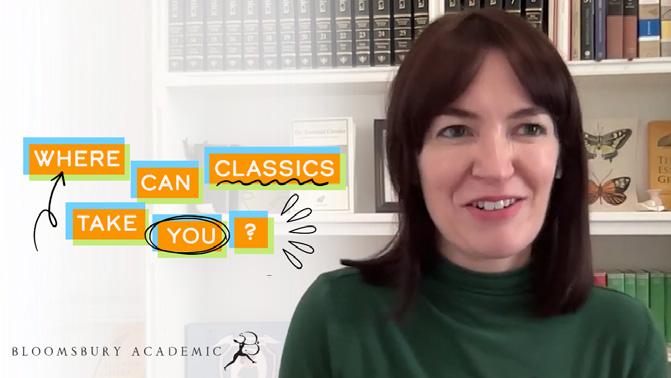
Women Creating Classics
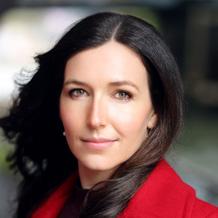
Emily Hauser is Senior Lecturer in Classics and Ancient History at the University of Exeter, UK. She is author of Mythica: A New History of Homer’s World, Through the Women Written Out of It (2025), How Women Became Poets (2023) and For the Most Beautiful (2016). She is co-editor of Reading Poetry, Writing Genre (2018).

Helena Taylor is Associate Professor of French and Comparative Literature at the University of Exeter, UK. She is author of Women Writing Antiquity: Gender and Learning in Early Modern France (2024) and The Lives of Ovid in Seventeenth-Century French Culture (2017). She is co-editor of Ovid in French: Reception by Women from the Renaissance to the Present (2023) and Women and Querelles in Early Modern France (2021).
“Your sex are not thinkers, you know – varium et mutabile semper – that kind of thing. You don’t know Virgil.”
In the words of Mr. Brooke from George Eliot’s Middlemarch (1871–2), women are said – by nature, and in the words of a poet they’re apparently unable to understand – to be incapable of the rigours and complexities of Classics. Yet women, both fictional and real, are drawn to the ancient world over and over again.
Maggie Tulliver in The Mill on the Floss (1860), discovers Latin when she visits her brother; she wants to know whether Philoctetes had a sister. But she is told by her brother Tom, just like Mr. Brooke, that “Girls never learn such things. They’re too silly.” Virginia Woolf, the renowned Bloomsbury Group writer, also heard about the ancient world from her brother first, and opened her essay, “On Not Knowing Greek”, with the pronouncement that “it is in vain and foolish to talk of knowing Greek, since in our ignorance we should be at the bottom of any class of schoolboys.”
Yet, like Maggie Tulliver, she too is drawn to the ancient languages and cultures from which she has been excluded. And she, too, wonders about a sister (this time of Shakespeare, a gifted writer, in Woolf’s imagination, whom she fictively christens “Judith”): not only whether she existed, but pointing out that, even if she had, she would have had neither the education (“Latin – Ovid, Virgil and Horace”), nor the opportunity, to pursue her talents.
But from exclusion comes the burning questions that challenge – and forge – the discipline. These are issues of visibility and transmission. Did Philoctetes have a sister – and if so, why haven’t we heard of her? They are questions of education and access. What might women have done if they had been offered the same education as schoolboys? And they are demands around the opportunity to have a say in the discipline in creative and non-traditional ways – to write with a “genius for fiction” (as Virginia Woolf puts it), to wield creativity to confront and shape the canon, to re-think and read the past in new and unpredicted ways.
It is not, then, only about where Classics can take women. This is the story of where women can take Classics.
In the last decade or so, a surge in retellings of the myths and texts of the ancient world – from Madeline Miller’s Song of Achilles (2011) to Kamila Shamsie’s Home Fire (2017) to Pat Barker’s The Silence of the Girls (2018) – has made this fact more palpable than ever: that women have something to say in the retelling and response to the ancient world, and that that, in turn, must reshape how Classics sees itself.
No-one can read the Iliad after The Song of Achilles and see it the same way. No-one can believe that Homer is (or should be) all about men after The Silence of the Girls. No-one can deny the pressing questions ancient literature asks of us, and that we might ask of the discipline and its traditions, after reading Home Fire. Yet, while this is happening on a greater scale than ever before, the tale of women’s challenges to Classics and its exclusions is one that – as Eliot and Woolf show – has a much, much longer history.
In two edited volumes published this year by Bloomsbury – Women Creating Classics: A Retrospective (vol. 1), and Women Re-Creating Classics: Contemporary Voices (vol. 2) – we bring together these two threads to tell the story of how women have created, and are re-creating, Classics.
Women Creating Classics
This new and ground-breaking collection of essays, original short stories and poems, interviews and roundtables, our contributors – both scholars and writers, from Madeline Miller to Jennifer Saint to Nikita Gill and more – dives into the long history of women’s creative engagement with Classics, against all the odds – and the contemporary upswell in women’s re-creations of the ancient world. As one of our contributors, Francesca D’Alessandro Behr, puts it: “the articles included in the volume underscore the vital role of women’s voices in reshaping the classical tradition – often in resistance to their historically male-dominated environments. They explore how women throughout history have reinterpreted and responded to classical texts, challenging traditional notions of gender, race, class, and cultural authority.”
But this is also a tale of today: the interaction with the past (“Classics can take us to the past, without us ever having to leave our rooms,” writes another contributor, author Caroline Lawrence), the widening of engagement with it (“I am now part of that process, rather than observing from the margins”, writes Jessica Lawrence; or as Isobel Williams puts it, “You don’t need a Classics degree to hear old Triton blow his wreathèd horn”), and the challenges and opportunities of that engagement (“although the stories are old, they always present new opportunities to speak to modern audiences”, says Christine Plastow). As Madeline Miller writes in her essay for the second volume, Women Re-Creating Classics: “there is something about speaking back, yes to speaking back – but also yes to putting in a new layer, that we can stand on, in a different way.”
No doubt Maggie Tulliver, and Virginia Woolf – and even Judith Shakespeare – would have agreed with that.
How women are creating and re-creating classics
Order your copy of���
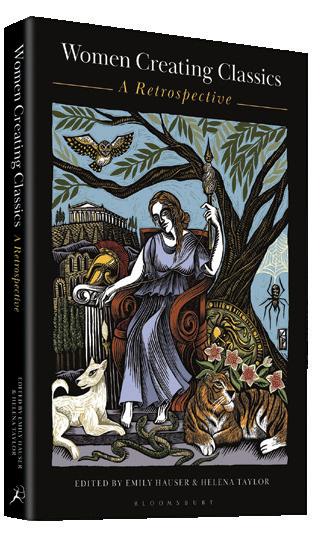

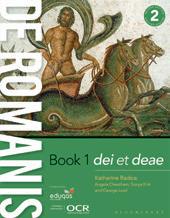


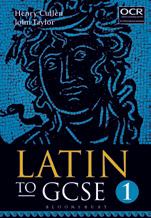


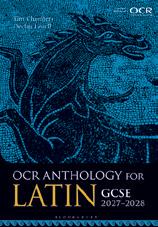
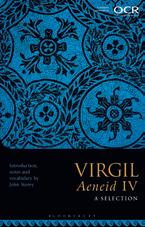
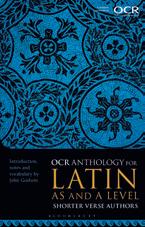
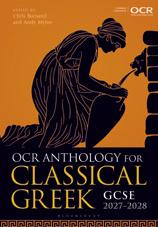
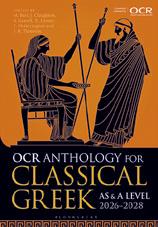







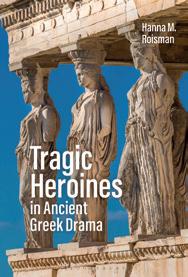



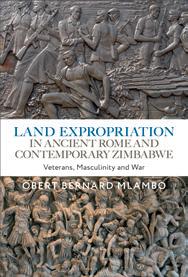
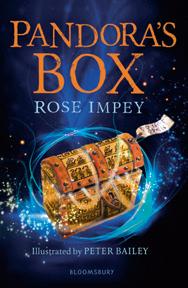



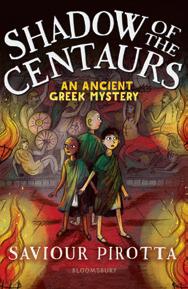

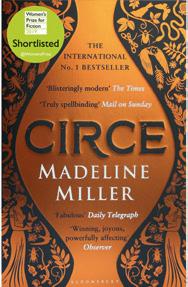



How Can You Get Involved?
SUPPORT AND RESOURCES FROM OUR PARTNERS
THE CLASSICAL ASSOCIATION

Who are we for?
Everyone! We’re an educational charity with a wide membership, from amateur archaeologists and trainee teachers, to students and scholars alike, and we have lots of resources, events and opportunities for anyone with an interest in the ancient world.

What do we do?
• We provide grants for schools’ events, outreach initiatives, summer schools & more
• Through our network of local branches, we promote Classics in local areas
• We co-organise the UK’s largest annual Classics conference, feat. the latest research and pedagogy, keynote lectures, performances, prizegivings, receptions and more
• Our Teaching Board supports current and new teachers of all classical subjects




How can I get involved?
• Enjoy interviews, Classics content and much more on The Classics Podcast
• If you’re a teacher, contribute to our Qualifications Review
• Read our academic and pedagogy journals and Omnibus for all ages
• Sign up to our free e-news and education bulletin
• Come along to our in person events and lectures or access CPD
• Enter our Competitions, ask our Expert in Residence a question and get involved!
The WCC is one of the longest-serving affiliate organisations of the Society for Classical Studies, the principal society in North America for the study of ancient Greek and Roman languages, literatures, and civilisations.
Founded in 1972, the mission of the WCC is to promote gender-informed perspectives in the study and teaching of all aspects of ancient Mediterranean cultures, particularly in the study of women, gender, and intersectionality in classical antiquity.
Additionally, we support scholars from all genders and from historically underrepresented groups (including women, non-binary identified, people of colour, trans people, first-generation students, people with disabilities.) so they can thrive as scholars and full human beings in the field of Classics and in their pursuit of knowledge about the ancient Mediterranean world. To that end, the WCC seeks to create a community that supports the well-being of its members through programs and professional development opportunities related to research, teaching, service, and advocacy.
How Can You Get Involved?
SUPPORT AND RESOURCES FROM OUR PARTNERS
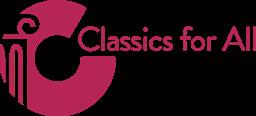
Classics for All supports state schools across the UK, many in areas of socio-economic disadvantage, to introduce or develop the teaching of classical subjects sustainably on the curriculum or as an after school activity.
What they do:
• Advise schools on the teaching of Latin, Greek, ancient history and classical civilisation on or off the school timetable.
• Offer free training Continuing Professional Development for teachers in schools wishing to introduce Classics or to extend existing Classics provision.
• Offer teachers continued mentoring to ensure that Classics teaching is sustained.
• Develop stimulating and engaging resources to support the teaching of Classics.
• Advocate for Classics with state schools, policymakers and donors.
• Research and evaluation into the impact of Classics on pupils’ aspiration and attainment.
Find out more at https://Classicsforall.org.uk
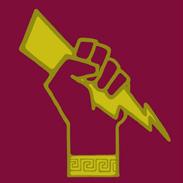
WORKING CLASSICISTS
What is a "Working Classicist"?
To be a Working Classicist is a way for a whole group of people - amateurs, academics and professionals - to identify themselves with pride, and to make connections with others from a similar background.
It is a way of overcoming the imposter syndrome which so many Classicists from the 93% feel.
It is for those who consider themselves socialists, who feel the world can be fairer, and who want to see changes in attitudes which have been entrenched over centuries around class-worth, academic opportunity, gender and sexual-orientation prejudice, racism and arbitrary exclusion created by our society and its institutions.
How Can You Get Involved?

THE HOME OF CLASSICS TEACHERS
The Classics Library is the site for all Classics teachers and teachers-to-be.
Founded in 2008 by Steve Jenkin, it hosts thousands of resources, all of which have been generously added to the ‘library’ by its own members. It is a hub for Classics teachers and academics, promoting events around the UK and often overseas, and providing a large network where everyone is welcome to ask for advice and support, and others are happy to help. “I am very excited to have joined
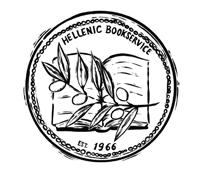
Want to get involved? Let us know!
Online Survey
Have you studied a Classical subject or language at any level? We'd love to hear from you! Tell us why you love Classics and help us highlight the many opportunities that studying this subject can bring.

www.bloomsbury.com/WhereCanClassicsTakeYou
